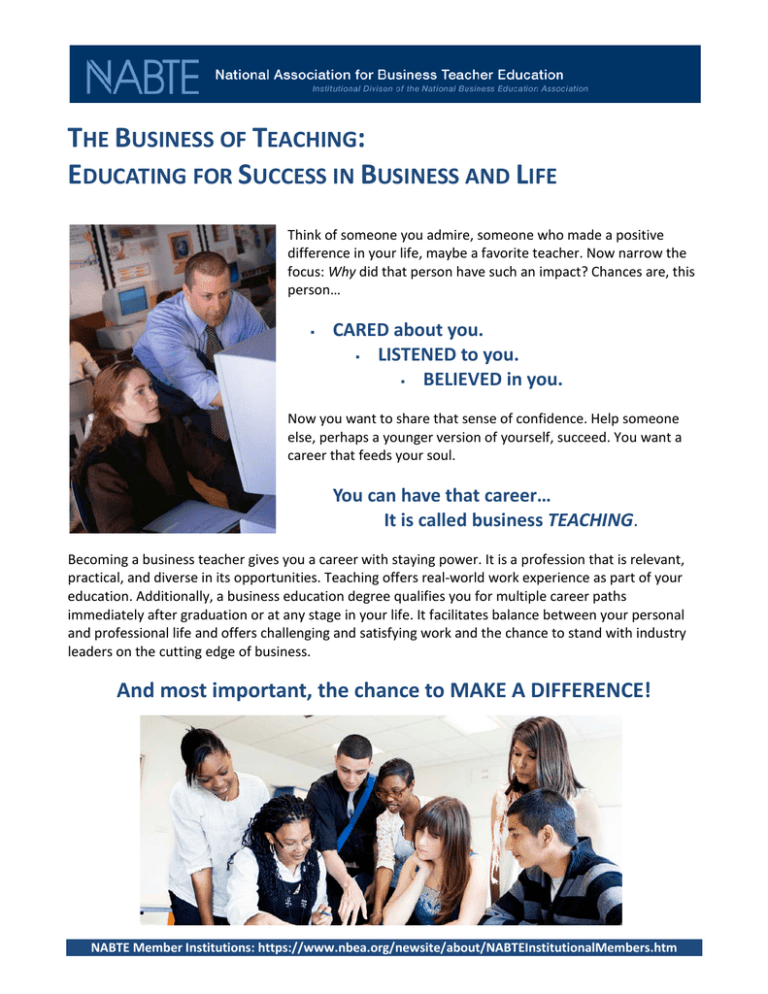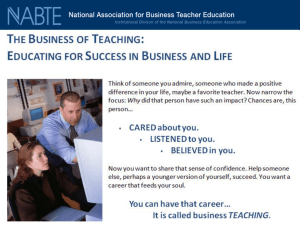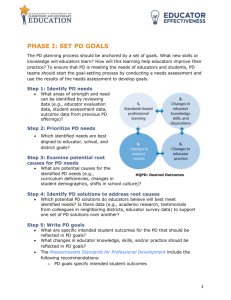T B : E
advertisement

THE BUSINESS OF TEACHING: EDUCATING FOR SUCCESS IN BUSINESS AND LIFE Think of someone you admire, someone who made a positive difference in your life, maybe a favorite teacher. Now narrow the focus: Why did that person have such an impact? Chances are, this person… CARED about you. LISTENED to you. BELIEVED in you. Now you want to share that sense of confidence. Help someone else, perhaps a younger version of yourself, succeed. You want a career that feeds your soul. You can have that career… It is called business TEACHING. Becoming a business teacher gives you a career with staying power. It is a profession that is relevant, practical, and diverse in its opportunities. Teaching offers real-world work experience as part of your education. Additionally, a business education degree qualifies you for multiple career paths immediately after graduation or at any stage in your life. It facilitates balance between your personal and professional life and offers challenging and satisfying work and the chance to stand with industry leaders on the cutting edge of business. And most important, the chance to MAKE A DIFFERENCE! NABTE Member Institutions: https://www.nbea.org/newsite/about/NABTEInstitutionalMembers.htm PORTRAIT OF A PROFESSION: BUSINESS EDUCATION Business teachers prepare people for careers in business and education. In high schools, business teachers help students understand the basic skills and knowledge needed to become gainfully employed and to be productive, contributing members of society, or to continue their education. In community colleges, business instructors teach business or technical courses in their areas of expertise. In universities, business education professors prepare students to teach business courses in high schools and colleges. Want to know more? Here are examples of award-winning Business Education professionals… CARRIE ANN PRATT, McMillan Magnet Middle School, Omaha, Nebraska. Ms. Pratt’s classroom is used as a demonstration model site for Common Sense Media, a national organization that gives students, parents, and teachers information about media safety and internet ethics. She pilots lessons, integrating them into her technology classes. After students complete the lessons and learn more about specific computer applications, they provide comments, questions, and ideas on how the information in each lesson could be improved. CYNTHIA S. JOHNSON, Jefferson County North High School, Winchester, Kansas. When Ms. Johnson was a first-year teacher, she was placed in charge of a struggling yearbook program. A persistent innovator, she didn’t let her lack of experience handicap her. Instead, she attended intensive yearbook training programs. She sponsored fundraising activities to help defray yearbook costs, then set about creating a world-class product. Two of her school’s yearbooks were selected as samples and nine as semifinalists in national competitions, catapulting her students’ work into the top 2.5% and top 10%, respectively, of contenders nationwide. LINDA D. MILLER, Northeast Community College, Norfolk, Nebraska. Ms. Miller’s students give her an “A” for being Awesome—they say online or in-office, she knows how to help them understand the subject, makes class fun yet very challenging, and relates material to career fields. The Vice President of educational services at her college noted that she “has been instrumental in [revising] our accounting program…which has [increased] student numbers in the program and [graduated] more accounting students than we have ever had… Our students are finding quality entry-level employment and satisfying regional employers with their accounting knowledge and skills.” DIANE FISHER, University of Southern Mississippi in Hattiesburg. An active leader in local, state, and national professional organizations, Dr. Fisher’s teaching evaluations consistently rank among the highest scores obtainable at her university. A model educator, she strives to improve instruction and course offerings to meet the needs of every student. Thanks to her guidance, several of her university students achieved national, state, and local recognition for their teaching skills. She routinely involves her students in research that leads to presentations at professional conferences. STEPHEN D. LEWIS, Middle Tennessee State University, Murfreesboro. Dr. Lewis has forged strong relationships with local businesses and with principals and superintendents. Each year students participate in office-based internships, and overall the university has placed dozens of students in teaching positions. To maintain program strength, Dr. Lewis ensures that several members of the faculty work closely with the State Department of Education to keep business education “top of mind” and to be apprised early of any legislation or other proposals that might impact business education. As a result, the department has a respected and strong voice regarding curriculum and other business education issues. NABTE Member Institutions: https://www.nbea.org/newsite/about/NABTEInstitutionalMembers.htm REASONS TO MAJOR IN BUSINESS EDUCATION Give a little, get a little. Give a lot, get a lot. It is the same with a career. Ask business educators why they do what they do, and here is what they will tell you: It is rewarding, fulfilling, energizing. 10 THINGS BUSINESS TEACHERS GIVE THEIR STUDENTS 1. 2. 3. 4. 5. 6. 7. 8. An orientation to the world of work, which is another word for opportunity. Hands-on learning about what it means to be part of a team. Enhanced literacy in technology, personal and business finance, communications, international commerce, and organization and management. The desire to work harder and better than they thought possible—and like it. The chance to develop marketable skills and habits they can apply to any career. A personalized learning environment. The chance to develop practical skills like writing a resume and knowing how to dress and present themselves in an interview. The opportunity to discover a job or career they will fall in love with. 9. The confidence and competence they need to be employable. 10. The skills to make a living, support a family, pursue their dreams, and succeed in business and in life. 10 THINGS BUSINESS TEACHERS GET FOR THEIR EFFORTS 1. The chance to stay up-to-date on the latest technology and business trends, which doubles your employment options: you can work as a teacher or as a businessperson in virtually any industry, based on your area of expertise (accounting, marketing, information systems, management, economics and personal finance, etc.). 2. Rarely, if ever, having to answer the question, "Why are we doing this?" or "When will we ever use this?” Students want to be in your classes because what you are teaching relates to everyday life. 3. The privilege of teaching what you do best, in an environment where every day is different. Bored? Never! 4. Work schedules that are compatible with family life. 5. Respect from the business community for your organizational skills, your expertise in training employees, and your ability to speak the language of business. 6. The opportunity to be actively involved—no sitting behind a desk all day—with people who love students, love learning, and love life. 7. Instant rewards: your amazement at seeing the skills your students have learned in such a short time, and their pride in mastering those skills. 8. The chance to belong to a supportive and respected professional team, working alongside colleagues who generously help you develop into the best teacher you can be: by listening, sharing ideas, or mentoring. 9. Students who come back to thank you for what they learned in your class. 10. What you cannot get anywhere else: the chance to help someone believe in himself. NABTE Member Institutions: https://www.nbea.org/newsite/about/NABTEInstitutionalMembers.htm YOUR “TYPICAL DAY” AS A BUSINESS EDUCATION TEACHER: REAL WORLD, REAL RELEVANCE As a business educator, you teach a curriculum that is relevant to everyone, whether your students are planning to attend a four-year college, enroll in a community college or technical training school, or seek a job immediately after high school. You will work with students like these: Deanna, who wants to build her business skills to prepare for a career as a pediatrician or dietitian; Lina, who plans to work with computers because she enjoys them and technology jobs pay well; Massoon, who wants to start an air-conditioning technician business and is learning accounting as part of his training; and David, who wants to major in business administration at the collegiate level and eventually work for a Fortune 500 company, and is studying marketing and management. You become the bridge between your students and the business community. Partnerships with local businesses are a natural, and in most cases, a required, part of every business education program. Your students work on projects in which they learn by doing. They work in teams, refine their people skills, and establish business contacts. In one "typical" day—although no day as a business educator is ever typical—you might: Consult with students who are designing, creating, and publishing menus for a local restaurant, and with others who are creating and maintaining Web sites for community nonprofit organizations and arts centers. Work with a bank as you guide students through all aspects of applying for a loan. Coach students who are presenting a workshop at a local conference on employment practices. Observe students at work sites where you have placed them in cooperative education programs. Advise students who are writing a business plan for a neighborhood fitness center and those who are developing marketing materials for the neighborhood jeweler. Manage any of a dozen different individual study or extracurricular projects, such as launching a new magazine about sports activities at your high school, designing business cards for school faculty, or organizing the publicity and photographs that will be used to create a brochure for your school's soccer tournament. The Bigger Picture Just like any career, business education has its benefits: You work with students who are enthusiastic and motivated, managing their internships, apprenticeships, cooperative work programs, job shadowing initiatives, and service learning activities—but you may put in longer hours to complete everything on your "to-do" list. You teach skills that students want to learn, but it can be stressful trying to be available for everyone who needs your help—especially if they all need you at once! You may work with the latest and greatest technology—but machines can also break down when you most need them (for example, when your students are printing their final exams). You are more highly paid than some workers, and less well compensated than others. You may have to meet the needs of students with widely different ability levels, and you may not cover all the content you intended to. NABTE Member Institutions: https://www.nbea.org/newsite/about/NABTEInstitutionalMembers.htm EMPLOYMENT FORECAST: BUSINESS TEACHER The U.S. Labor Department says business, health, and education services will account for 70% of growth in the service industry in the next 10 years. By 2018, the number of jobs in education is projected to increase by 2.3%. Most of the new jobs will be for teachers, and employment of secondary school teachers is expected to grow faster than average. In the business education field specifically, half of all business educators teaching today are expected to retire in the next decade. Need for Business Educators. The business world is calling for a renaissance worker: Someone with the smarts to solve problems rationally and effectively, whether on a local or national level; the literacy and flexibility to successfully deal with ever-changing technology; and the creativity and leadership to help companies compete in the world economy. Business relies on business education teachers to help train this kind of worker. Business educators understand what is important to the business community and which skills are essential for success on the job. Because they have real-world experience and regular contact with local employers, business educators are in a perfect position to transfer knowledge of these skills to students and help them become competent and successful. Business educators are also needed to teach the courses that help students succeed in their personal lives. Students learn how to understand and make intelligent decisions about their own finances. As active participants in civic life, business students can contribute this knowledge of economics to the communities and organizations important to them. Salaries. The American Federation of Teachers reported beginning teachers earn an average salary of $33,227. Median annual salaries for all teachers range from $47,100 to $51,180, with the top 10 percent of teachers earning $75,190 to $80,970 (Occupational Outlook Handbook, 2010-2011 edition). Of course, salaries vary by state and school district. The longer you teach and the more education you have, the more you are paid. Taking on additional responsibilities, such as advising student groups and extracurricular activities or serving as a department chair, can also increase your salary. NABTE Member Institutions: https://www.nbea.org/newsite/about/NABTEInstitutionalMembers.htm IS BUSINESS EDUCATION RIGHT FOR YOU? Effective business educators come in all shapes and sizes and from all kinds of backgrounds. Yet they share certain traits that help them succeed in the specific work they do. For instance, business educators teach, coach, motivate, and inspire. Many classrooms are becoming less structured, more relaxed, as students and teachers work to discuss and solve problems together. Business education, with its emphasis on real-time learning and real-world relevance, can be a great opportunity for someone who: Cares about helping young people make career choices. Is passionate about working with students and with business professionals to make learning more relevant. Likes finding creative ways to teach students what they want and need to know. Has lots of energy and patience. Likes reading and learning about business topics. Wants to teach others what she or he has learned. Something back to the school or community. Has or could develop strong technology skills. Is a risk taker who thrives on trying new things. Can do, and enjoys, multitasking. Is organized, committed, and focused, and does not want to sit at a desk all day. Sees oneself as a person who invents possibilities and wants to be part of a dynamic, ever-changing environment. Values variety and a career that offers multiple job options. Wants to join a professional learning community that strives for excellence. Next Steps Imagining yourself as a business educator is the first step to becoming one. But where do you go from there? If you are in high school, visit your business teacher or your guidance counselor and say that you are interested in pursuing a career in business education. Ask for advice about the best courses for you. Seek job opportunities that will give you practical business experience. If your school participates in Future Business Leaders of America (FBLA) or Business Professionals of America (BPA), join. Finally, begin learning about which colleges or universities offer accredited business education programs. If you are in college, seek out a professor of business education and make your intention known. If your school does not have a business teacher education department, contact the National Business Education Association (www.nbea.org) to find out more about what you can do and where you can go to get the credentials that will allow you to become a business educator. On the practical side, you may qualify for federal financial aid loans and grants, state government loans, college and university-funded aid, or privately funded aid programs to finance your education. If you enter the teaching profession, some states offer "forgivable" loans, depending on where and what you teach after you graduate. NABTE Member Institutions: https://www.nbea.org/newsite/about/NABTEInstitutionalMembers.htm INVENTING POSSIBILITIES THROUGH EDUCATION AND EXPERIENCE To become a business teacher, you will need to complete an approved four-year program at a university that has a business teacher education major/concentration. (A college or university may require you to obtain a degree in a program content area [for example, business administration] and then get your teacher's certification.) Some of your courses will be taught by business and education professors and still others by practicing business professionals. You will study a variety of disciplines including… accounting business law career development communications computation economics and personal finance entrepreneurship information systems international business management and marketing interrelationships of business functions You will also complete a student teaching experience under the supervision of a local high school teacher and your cooperating business education professor. Licensure. In some states, you will be required to get concrete, hands-on business experience, perhaps by completing an internship or by participating in a paid cooperative work program, before you can be licensed to teach business education. You may need to pass a national test for certification. On the job. Once you are licensed, you might decide to teach in either public or private schools. You may have the opportunity to expand your expertise by: Becoming a lead teacher or department chair. Working with students as a mentor or as an advisor to the local chapter of a business student organization. Supervising students in a work environment. Working with state education departments. Becoming a school or department administrator. Developing a mentoring program for students, new teachers, or business education majors. Teaching via distance learning technologies. Serving in leadership positions on business advisory boards or in business-school-community partnerships. Participating in your state and national business education professional associations. In the summer, you may participate in staff development programs, learning about new and emerging technologies or writing the business education curriculum for your county or state. Or you might decide, as one high school business education teacher did, to have fun—she created and taught a technical adventure camp geared to middle school students. Expanding your knowledge. After teaching for a few years, you might decide to continue your education as a graduate student, working with a faculty advisor to get the training you need to teach business education in a community college (a master's degree) or university (a doctoral degree. There you might opt to combine your teaching career with a consulting position in industry. Alternate career paths. If and when you are ready for a break from the classroom, many paths are open to you, including corporate training, management, organizational development, and instructional design for performance improvement. Many of these opportunities will be in traditional face-to-face environments, but some might exist in virtual, or electronic, learning formats. NABTE Member Institutions: https://www.nbea.org/newsite/about/NABTEInstitutionalMembers.htm



